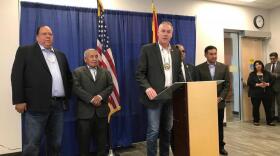A dry winter for the region feeding the Colorado River means Lake Mead's water level could drop, but not enough to trigger an emergency shortage declaration that would force water cutbacks in Nevada and Arizona.
The U.S. Bureau of Reclamation has projected the reservoir east of Las Vegas to fall as much as 11 feet (3 meters) by the end of the year, about 2 feet (0.6 meters) above the trigger line, the Las Vegas Review-Journal reported Monday.
If a federal shortage declaration was called, Nevada would be required to reduce its river use by 4 percent and Arizona would cut back by 11 percent.
The river system supplies about 90 percent of the Las Vegas area's drinking water.
Southern Nevada residents have conserved enough water to mitigate the effects of a cutback, but a prolonged shortage would prove difficult for the area's growing water demands to be met, Southern Nevada Water Authority officials said.
This winter has put the Colorado River Basin on track to be one of the driest on record, forecasters said.
"This entire water year has been characterized by way below-average precipitation; it's bad everywhere," said Paul Miller, service coordination hydrologist with the National Weather Service's Colorado Basin River Forecast Center.
Arizona's snow levels are about one-third their normal levels, Miller said.
The basin's snowpack usually peaks by April and then begins melting and flowing through July into Lake Powell on the border between Utah and Arizona. Lake Powell is expected to receive about 43 percent of its average inflow this year.
While this year's snowpack is low, the above-average snowfall and runoff last year boosted reservoirs across the region, Miller said.
Forecasters are hopeful that a storm could deposit snow across the basin, but it's unlikely the precipitation would have much of an impact, Miller said.
"It won't be enough to turn things around," Miller said. "I think there is some hope things won't get worse."







